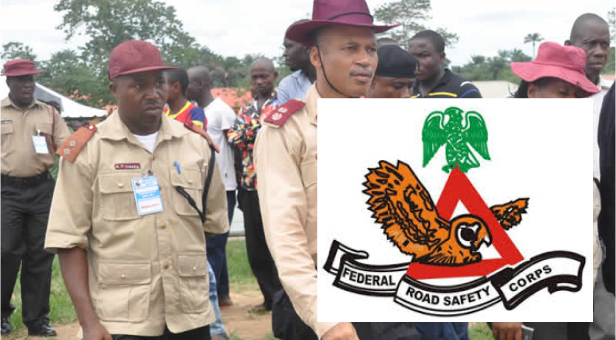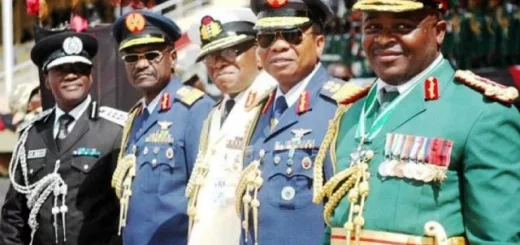FRSC Officers: Ranks in Federal Road Safety Corp of Nigeria
Before we delve into the FRSC officers ranks lets give a brief introduction of the FRSC and their functions.

The Federal Road Safety Corps (FRSC) is a government agency in Nigeria responsible for road safety. The FRSC was established in 1988 with the goal of reducing road accidents and fatalities in the country. FRSC officers play a vital role in road safety, carrying out a various duties. In this blog post, we will take a closer look at the FRSC rank structure and the different roles and responsibilities of FRSC officers. We also provided additional information on how to join the FRSC as a graduate.
RESPONSIBILITIES OF FRSC OFFICERS
The Federal Government in December, 1988 established the Federal Road Safety Commission through Decree No. 45 of the 1988 as amended by Decree 35 of 1992. The FRSC is saddled with the following key functions
- Regulating the highway for motorists and other road users to avoid accidents.
- Recommending devices and strategies to eliminate or reduce accident risk on the highway.
- Providing the necessary advice to the Federal and State Governments including the Federal Capital Territory Administration and relevant governmental agencies on the localities where such strategies and devices are required, and
- Sensitizing motorists and members of the public on the importance of discipline on the highway.
FEDERAL ROAD SAFETY CORP (FRSC) OFFICERS RANK STRUCTURE
The FRSC rank structure is designed to ensure that officers are promoted based on their experience, qualifications, and performance. There are four main categories of ranks in the FRSC:
- Junior Marshals
- Non-Commissioned Officers (NCOs)
- Senior Non-Commissioned Officers (SNCOs)
- Commissioned Officers
- Special Marshals are voluntary personnel who assist the FRSC in carrying out its duties. They are not part of the FRSC rank structure, but they are highly respected for their contributions.
Here’s a tabular representation of the ranks in the Federal Road Safety Corps (FRSC), organized by their respective categories:
| Category | Ranks |
|---|---|
| Junior Marshals | Road Marshal Assistant III (Entry Point) |
| Road Marshal Assistant II | |
| Road Marshal Assistant I | |
| Senior Road Marshal Assistant | |
| Deputy Chief Road Marshal Assistant | |
| Chief Road Marshal Assistant | |
| Non-Commissioned Officers (NCOs) | Marshal Inspector III |
| Marshal Inspector II | |
| Marshal Inspector I | |
| Senior Non-Commissioned Officers (SNCOs) | Senior Marshal Inspector |
| Principal Marshal Inspector | |
| Assistant Chief Inspector | |
| Deputy Chief Inspector | |
| Chief Inspector | |
| Commissioned Officers | Assistant Route Commander (Entry Point) |
| Deputy Route Commander | |
| Route Commander | |
| Superintendent Route Commander | |
| Chief Route Commander | |
| Assistant Corps Commander | |
| Deputy Corps Commander | |
| Corps Commander | |
| Assistant Corps Marshal | |
| Deputy Corps Marshal | |
| Corps Marshal |
This table organizes the ranks in the FRSC by categories and lists the individual ranks within each category.
FEDERAL ROAD SAFETY CORPS STAFF WELFARE
HEALTH CARE
The federal road safety corps provides medical care and facilities to road accident victims and staff members. The Federal Road Safety Commission has provided a total of 20 roadside clinics, 12 zonal clinics and 1 clinic at the headquarters. There are 23 medical doctors, 121 nurses, 51 paramedics and 57 supporting staff who manage the clinic.
HOUSING
The Federal Road Safety commission provides housing benefits for staff members through the FRSC housing cooperative scheme that was inaugurated in March 2004. The concept of this scheme was born out of the burning desire to assist members who also contribute to the National Housing Fund to access the Federal Mortgage Bank Loan and become proud owners of their houses which they may retire to.
The objective of the scheme is;
- To procure, build, and allot empty lands to her members
- To manage the estates for serving and retiring/discharging service-personnel.
COOPERATIVE SOCIETY
The Federal Road Safety Commission Cooperative society help members’ access loan, savings, and all buy goods at rate form trusted customers. An example of goods provided by the cooperative society on a subsidized rate to the member staff is the list of verified car brands for interested members.
SPECIAL MARSHALS WELFARE
Special marshals are covered by an insurance policy in case of death through road traffic accident. They are also protected by immunity provision in the Act. By this immunity clause, the special marshal is shielded from liability for any act validly done by him on the route to which he is assigned.
It is observed that the Federal Road Safety Corps officers’ salaries are calculated based on their ranks just like other government agencies like; The Nigerian Police, Navy, Air force, and The Nigerian Army.
It is also important to note that the salary structure given above is gotten from the Consolidated Para-Military Salary Structure (CONPASS).
HOW TO BECOME A FRSC OFFICER AS A GRADUATE
The Federal Road Safety Corps (FRSC) plays a pivotal role in ensuring the safety and efficiency of Nigeria’s roadways. As the nation’s primary traffic management agency, the FRSC is tasked with enforcing road traffic regulations, preventing accidents, and providing assistance to motorists in need. Becoming an FRSC officer is not just a career choice; it’s a commitment to safeguarding lives and promoting order on Nigeria’s roads.
In this section, we will take you through a step-by-step journey on how to become an FRSC officer in Nigeria. Whether you’re a fresh graduate or seeking a career change, understanding the eligibility requirements, recruitment process, and the training involved is crucial to embark on this rewarding path. So, if you aspire to be a part of an organization dedicated to making Nigerian roads safer for everyone, read on to discover the road to becoming an FRSC officer.
ELIGIBILITY AND REQUIREMENTS
Becoming an FRSC officer in Nigeria comes with specific eligibility requirements. To qualify for this role, candidates must meet the following criteria:
- Educational Qualifications: To be eligible for FRSC recruitment, you typically need to have a minimum of a Senior Secondary School Certificate (SSCE) or its equivalent. However, some positions may require a higher educational qualification, such as a bachelor’s degree. It’s essential to review the specific job requirements for the position you’re interested in to ensure your educational background meets the criteria.
- Age Requirements: The FRSC typically sets age limits for applicants. While these requirements may vary depending on the specific job position, candidates are generally required to be within a certain age range, often between 18 and 30 years. Be sure to check the official recruitment announcements for the most up-to-date age requirements.
- Physical and Medical Fitness: As an FRSC officer, you’ll be responsible for ensuring road safety and assisting motorists. Therefore, you must be in good physical and medical condition. Candidates are usually subjected to a medical examination to ensure they meet the necessary health and fitness standards.
- Character and Conduct Criteria: The FRSC places a high value on integrity, discipline, and good character. Applicants should have a clean criminal record and a reputation for honesty and trustworthiness. Any history of criminal behavior or unethical conduct may disqualify a candidate.
- Other Necessary Prerequisites: Depending on the specific job role, there may be additional prerequisites. For example, some positions may require a valid driver’s license, computer skills, or specific certifications. Carefully review the job descriptions and requirements provided in the official recruitment announcements to ensure you meet all necessary prerequisites.
UNDERSTANDING THE RECRUITMENT PROCESS
Now that you understand the eligibility and requirements, let’s delve into the recruitment process. The FRSC’s recruitment process typically follows several stages:
- Application and Submission: The first step is to monitor official recruitment announcements and submit your application online through the designated portal. Pay close attention to deadlines and ensure you provide all required information and documents.
- Screening and Shortlisting: After the application submission, the FRSC conducts an initial screening to verify that applicants meet the minimum requirements. Shortlisted candidates will be invited to proceed to the next stages of the recruitment process.
- Physical and Written Examinations: Shortlisted candidates may be required to participate in physical fitness tests and written examinations. These assessments evaluate your physical capabilities, knowledge of road safety regulations, and problem-solving skills.
- Interview and Medical Evaluation: Successful candidates from the previous stages will face interviews to assess their suitability for the role. A medical evaluation will also be conducted to ensure that candidates are physically fit to perform their duties effectively.
- Final Selection and Training: The final step involves the selection of candidates who have successfully passed all previous stages. Once selected, candidates will undergo training to equip them with the necessary skills and knowledge to become effective FRSC officers.
With these eligibility requirements, an understanding of the recruitment process, and proper preparation, you’ll be well on your way to pursuing a career as an FRSC officer in Nigeria.
HOW TO APPLY
To apply for a position with the FRSC, candidates must keep a close eye on official recruitment announcements, which are usually posted on the FRSC website or in national newspapers. The application process is typically conducted online through a dedicated portal. Follow these steps to complete your application:
- Visit the FRSC’s official website or the designated application portal.
- Create an account or log in if you already have one.
- Fill out the application form, providing accurate and up-to-date information.
- Upload scanned copies of required documents.
- Review your application to ensure accuracy and completeness.
- Submit your application before the specified deadline.
REQUIRED DOCUMENTS FOR SUBMISSION
When applying for an FRSC position, you’ll need to provide several documents to support your application. Commonly required documents include:
- Educational certificates (e.g., SSCE, degree certificates)
- Birth certificate or age declaration
- Proof of local government of origin
- Passport-sized photographs
- Character references, if requested It’s essential to check the specific requirements for the position you’re applying for as additional documents may be necessary.
Pay close attention to application deadlines, as late submissions are usually not accepted. Missing the deadline could result in your application not being considered. Be proactive and submit your application well before the closing date to avoid any last-minute issues.
CONCLUSION
The FRSC rank structure is designed to ensure that officers are promoted based on their experience, qualifications, and performance. This helps to ensure that the FRSC has a well-trained and experienced workforce that is capable of carrying out its important duties effectively.
The FRSC also has a diverse workforce, with officers from all walks of life. This diversity is a strength of the FRSC, as it allows the organization to draw on a wide range of skills and experiences.
The FRSC is committed to providing its officers with the training and resources they need to be successful. The FRSC offers a variety of training programs to its officers, covering topics such as traffic law enforcement, road safety education, and emergency response. The FRSC also provides its officers with the equipment they need to do their jobs safely and effectively.

